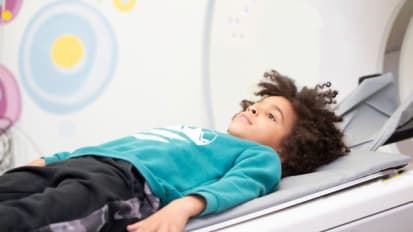Search Videos and More
 Video
Video
Keeping Kids in the Game: Prevention and Treatment of Sports Injuries
Physical therapist Tuan Mai, PT, DPT, discusses the lifelong benefits conferred by regular physical activity and the incidence of injuries among young athletes, detailing risk factors and how they can be addressed Video
Video
The Pediatric Cardiovascular Genetics Program: A Heart-to-Heart for the Whole Family
Learn how this growing program provides comprehensive care for families affected by hereditary heart disease. Video
Video
Pediatric Liver Tumor Update: The Complementary Roles of Primary and Specialty Care
With an increased incidence of liver cancer in U.S. children, pediatricians need to understand the most common tumors, pick up on possible signs and know first workup steps. Course
Course
Liver Transplantation: Indication, Allocation, and Inequity
Pediatric gastroenterologist and hepatologist Sharad I. Wadhwani, MD, MPH, reviews liver transplant indications and evaluation steps, explores current issues around risk scoring and organ distribution systems, and elucidates immediate and long-term monitoring considerations for these vulnerable patients. Course
Course
Examining Medical Traumatic Stress Through the Lens of Inflammatory Bowel Disease
Medical traumatic stress is common, especially in children with pediatric-onset disorders, such as inflammatory bowel disease, explains gastroenterologist Addison Cuneo, MD, and many even meet the criteria for PTSD. Course
Course
The Latest and Greatest in the Management of Pediatric Obesity- A Look at Incretin-based Therapies and Bariatric Surgery
With obesity affecting 1 in 3 U.S. kids (and comorbidities another looming threat), primary care providers need to understand the causes, the diagnostic process, and the reasons they shouldn’t delay starting treatment in young patients. Course
Course
Diabetes Update: How to Overcome Barriers to Optimal Glycemic Control
Pediatric endocrinologist Tariq Ahmad, MD, FAAP, believes that primary care providers can play a vital role in helping children with diabetes not only manage their blood glucose but avoid the burnout that leads to noncompliance and complications of the disease. Course
Course
Sounds of Success: Pediatric Audiology and Speech/Language Pathology Perspectives
Audiology specialists at UCSF Benioff Children's Hospitals offer this presentation to help pediatricians ensure that babies and toddlers not only are screened for hearing issues but receive the timely follow-up that can make a world of difference in their futures. Video
Video
Abdominal Masses in Pediatrics: Diagnostic Tools and Treatment Decisions
Pediatric surgeon Willieford Moses, MD, FACS, discusses steps in evaluation, including which imaging modalities are most useful, and describes keys to decision-making for neuroblastoma, hepatoblastoma, renal tumors, germ cell tumors and other tumors seen during childhood. Course
Course
Pediatric Abdominal Pain
Chronic abdominal pain is common in children, often keeping them out of school and affecting their quality of life. Fortunately, explains pediatric gastroenterologist Vivien Nguyen, MD, diagnosing DGBIs has become more straightforward, thanks to updated guidelines... Video
Video
Radiation Safety in Pediatrics: A New Look at Imaging Practices for Growing Bodies
This presentation from Jesse Courtier, MD, chief of pediatric radiology at UCSF Benioff Children's Hospitals, provides an update on X-ray and CT risks for kids and how protocols have been shaped to minimize harm and maximize diagnostic detail. Video
Video
When Puberty Shows Up Too Soon (or Too Late): A Guide for Pediatricians
In this talk, pediatric endocrinologist Jennifer Olson, MD, describes how the hormonal processes that lead to sexual maturity are currently understood; provides usable definitions of precocious puberty as well as delayed puberty; and lays out evaluation processes.

